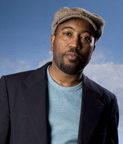Major Jackson is the author of “Hoops,” “Leaving Saturn” and “Holding Company,” three collections of poetry. He is the current Poetry Editor of “The Harvard Review,” the Green and Gold Professor at the University of Vermont and a faculty member of the Bennington Writing Seminars. He has received several awards for his work including the Whiting Writer’s Award. Staff Writer Shea O’Meara spoke with Jackson about his inspiration, his career and his advice for writers.

Shea O’Meara: What turned you on to poetry?
Major Jackson: I was somewhat introduced to poetry through my grandparents’ library, but it was something that was covered in high school extensively. I had a fantastic teacher who was passionate and enthusiastic about poetry’s ability to condense life, and I shared that passion. I also had a passion for music — I wanted to be an MC, a rapper. I wasn’t good. But it helped me to develop a relationship to language where I could appreciate language’s ability to pun and to insinuate.
SO: What inspires you to write?
MJ: The act of creating itself is a pretty profound experience. When I’m writing it’s as if I’m entering another dimension, as if time kind of stops. I can be writing and I’ll look up and come to realize that two hours or three hours have passed. Sometimes it gets me in trouble if I have a dentist appointment or haircut or something like that. What I value most is that experience of creating.
SO: What interests you in writing poetry?
MJ: I’m enthralled by human existence. I’m enthralled by relationships, both personal and intimate relations. The meanings behind which we express profound, deep connections and also how we tragically dishonor what it means to be human. I’m inspired by other artists, not just poets, but musicians, painters, sculptors. The portrait of ourselves in the arts is one that we should probably learn to value more.
SO: What is a typical day in your life like?
MJ: I do not write every day. Right now the normal day is teaching and giving readings and talking to aspiring writers, both undergraduate and graduate students. I teach in the Bennington Writing Seminars, and I’m also the editor of the Harvard Review. So I read a lot of other people’s work and oftentimes I’ll find inspiration from that, taking notes and keeping a journal of some sort so when it is time to sit down and write I’ll have some strands of ideas.
SO: Do you enjoy being a professor?
MJ: I do, I do — I love teaching. I particularly love passing on my passion and enthusiasm. That’s when I know learning is taking place, when I can somehow break through the apathy and mound interest and create lifelong students and readers of poetry. And maybe, maybe, practitioners — inspiring someone so much that they want to write their own poems and add to the conversation of poetry.
SO: What advice would you give to aspiring poets?
MJ: Read widely and read vertically. Only by acquainting oneself with what has been done before can one truly innovate and write poems that are original. Take care of yourself, eat well, exercise, that sort of thing. But also be open to discovering the world around you. Poets and artists have a keen sense of the world around them. They are able to find and experience new things in nature and conversation. They’re just very sensitive human beings, and that’s something that needs to be cultivated. Particularly in a society [in] which we aren’t encouraged to pay attention to what’s around us. We’re encouraged to pay attention to what’s next to buy, but in terms of appreciating the beauty that’s all around us, I don’t think we are. I don’t think that’s something that’s nurtured.
SO: What was the most amazing moment of your career?
MJ: When I go into a community center in which I’m standing before children, anywhere from the ages of 4 to 18, and I see and hear their voices and serve as an inspiration and a role model. That’s one of the most rewarding aspects of what I do. I’m taken back to my early experiences with language, and also we’re not just experiencing language in a poem and encouraged to write a poem, but also that next step which is to share. It’s beautiful to hear young people share their thoughts in their poems. It’s a gorgeous thing. You might have expected me to say having my first book published or winning an award; I think those are all fortunate events that happened in my career as a writer of poetry. I’ll use that word “career,” though I try not to think of it that way. Really, the real work for me is writing and sharing and hearing other people’s work.
SO: Anything else we should know?
MJ: I listen to everything from classical to hip-hop. I taught a course last term called Poetry and Hip-Hop, which was fun and had a wait list the size of a large sorority or fraternity. My favorite type of food is Italian; my favorite ice cream flavor is chocolate. I’m a big fan of fires, not fire fires, but making a fire in the winter — I think that’s the great thing about living in Vermont. I read so much poetry that I think it’s not good for my health. I think I’m aging myself.
Major Jackson will give a reading at 7:30 p.m. Tuesday in Clark Lounge.




